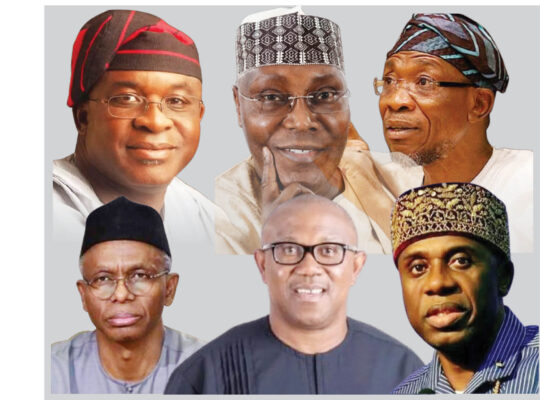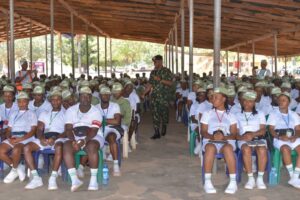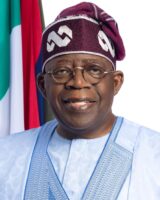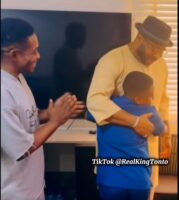By Ademola Lawrence
In the Book of John 4:16–19, Jesus said to the woman at the well: “Go, call your husband and come back.”
“I have no husband,” she replied.
Jesus said, “You are right when you say you have no husband. The fact is, you have had five husbands, and the man you now have is not your husband.” The woman said, “Sir, I perceive that You are a prophet.”
In that moment, Jesus unveiled a truth hidden behind human pretences. In the same prophetic tone, I referenced in my previous article “The Future of Opposition Politics in Nigeria: A Call for Ideological Awakening” that many actors who claim to be voices of the opposition are merely politicking with their purpose.
In this new piece, let’s examine the curious case of the recent political alliance under the African Democratic Congress (ADC), and why it has earned the apt theme: “The New Bride with Two Husbands.”
Atiku Abubakar: The Restless Aspirant
Former Vice President Atiku Abubakar is a constant in Nigeria’s political chessboard. He served as VP from 1999 to 2007, but by 2005-2006, cracks emerged between him and his principal, President Olusegun Obasanjo, after Atiku declared interest in succeeding him.
Obasanjo later reflected on this choice in June 2022: “One of the mistakes I made was picking my Number Two. But because it was a genuine mistake, God saved me.”
Read Also
That quote — from The Nation and BBC — speaks volumes. Despite Obasanjo’s regret, Atiku forged ahead, running for president under various platforms:
📌2007: AC — 2.6 million votes
📌2015: APC primaries — 954 votes (lost to Buhari)
📌 2019: PDP — 11.2 million votes (lost to Buhari’s 15.1 million)
📌2023: PDP – 6.9 million votes (came second)
Atiku’s trajectory shows a pattern: he aligns with platforms that offer electoral potential rather than building political structure organically. In contrast, even Nuhu Ribadu who ran under ACN in 2011 – secured over 2 million votes, same as Atiku in 2007.
Peter Obi: The People’s Politician
If popularity was the only currency, Peter Obi would be Nigeria’s president today. The former Anambra State governor served for 8 years under APGA and once vowed never to leave the party — until he did.
After the 2015 elections, President Jonathan appointed him chairman of SEC. In 2019, he joined PDP as Atiku’s running mate, but the ticket didn’t shift much in PDP’s strongholds.
In 2023, Obi ran under Labour Party and disrupted Nigeria’s political landscape:
* Mobilized Gen Z, Christian blocs, and the South-East
* Won Lagos State a shocker in Tinubu’s stronghold
* Polled over 6.1 million votes in his first solo run. Yet, his biggest challenge is navigating internal political dynamics and building alliances. While his support base is formidable, he must learn the art of negotiation within coalitions. Leadership, after all, requires both logic and emotional intelligence. A purely logical leader may appear robotic; a purely emotional one, inconsistent. The best leaders Mandela, Merkel, Obama combine both.
Nasir El-Rufai: The Technocrat-Turned-Troublemaker. Give El-Rufai his dues: a sharp mind, former FCT Minister, former Kaduna State Governor, and a founding member of APC. But he’s also known for his political contradictions and verbal missiles. Former President Obasanjo, in “My Watch” (Vol 2, pp. 110–112), described him as:
“Pathological in reputation savaging… loyal only to himself.” El-Rufai played a pivotal role in APC’s 2023 internal zoning, advocating power shift to the South. Yet, he couldn’t deliver Kaduna to the APC PDP won with over 554,000 votes to APC’s 399,000. His ministerial nomination under Tinubu was rejected, and now he criticises the same administration he helped usher in.
He has influence — no doubt — but political capital? That’s questionable.
Rotimi Amaechi: 24 Years, But to What End?
Few have served in public office as long as Amaechi: 8 years as Speaker, 8 years as Governor, 8 years as Minister. Yet, his electoral footprint is inconsistent.
* In 2015, he was Buhari’s campaign DG but couldn’t win Rivers State.
* In 2019, APC couldn’t field a candidate due to intra-party chaos.
* In 2023, he came second in APC’s presidential primaries (316 votes vs Tinubu’s 1271) and openly refused to support Tinubu.
Now out of office, he has publicly stated he’s “hungry” a revealing comment after 24 years in government. Like Atiku and Obi, he also promised a one-term presidency. But beyond promises, what does he tangibly bring to a coalition?
The ADC: A Political Polygamy in Crisis
Now to the bride herself: the African Democratic Congress. Suddenly adorned by a new set of suitors Atiku, Obi, El-Rufai, Amaechi ADC finds itself at the center of a power scramble. Yet, existing members cry foul. Former presidential candidate Dumebi Kachikwu has called it a hijack. Legal disputes now rage over the rightful chairman. The party is fractured.
This is a house with two husbands, both staking claim. The old guard feels betrayed, the new entrants claim to bring relevance. So who does ADC truly belong to?
Final Thoughts
Will the ADC endure this political ménage à trois? Will the bride pick one husband and divorce the other? Or will the aggrieved faction leave entirely?
In politics, coalitions are built on trust, compromise, and shared vision. But when ambition overshadows ideology, the foundation becomes shaky.
We will know soon in weeks, months, or by 2027.





